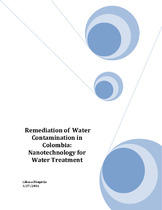Remediation of Water Contamination in Colombia: Nanotechnology for Water Treatment

View/
Date
2016-03-27Author
Dhupelia, Liliana
xmlui.dri2xhtml.METS-1.0.item-advisor
Martínez Tejada, Vladimir
xmlui.dri2xhtml.METS-1.0.item-type
doctoralThesis
Citación
Metadata
Show full item recordDocuments PDF
Abstract
Globally, an estimated one third of the world’s population lives in either waterscarce, or water-short areas. Worldwide, the supply of potable water is becoming more difficult because of the fast growing demand, which is exacerbated by population growth, global climate change, and water quality deterioration. Colombia’s National Health Institute reported in 2011 that half of the country’s States have contaminated drinking water. The report shows that only 12.5% of the States in Colombia have potable water, with the Surveillance System for Potable Water Quality warning that 15% of States have “high risk” water in that samples of water nationwide revealed contamination with residual chlorine, microorganisms, E.coli and coliform bacteria. Key contributors include activities that alter surrounding ecosystems, such as drainage, diversion of water for irrigation, industrial and domestic use, contaminating water with excess nutrient run-off (eg. from fertilizers) and waste, building dams, and deforestation. Extractive industries, in particular oil and gas exploration have resulted in increased deforestation and displacement of people. Similarly mining, especially illicit gold mining, has been a major contributor to the contamination of water supplies and the food chain with poisonous chemicals such as mercury and arsenic among others. Colombia is in the process of establishing and embracing a strong research and development foundation in the field of nanotechnology by creating research groups, networks and centres for excellence. Antioquia tends to be a leader in the field of innovation and could set the pace for the State and for Colombia by promoting and investing in R&D for emerging and innovative technologies for effective water recycling and purification using nanotechnology based solutions. Nanotechnology offers great opportunities to advance the treatment of water and wastewater as well as to augment potable water supply through safe use of unconventional water sources. It is therefore recommended that Colombia increases investment in R&D in the field of nanotechnology, particularly in technologies for the treatment and purification of water.
Keyword/s
Nanotecnología; Agua potable; Escasez de agua; Contaminación del agua; Crecimiento demográfico; Contaminación; Nanomateriales; Cambio climático global
Collections
The following license files are associated with this item:

